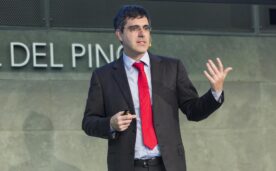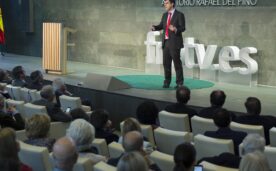The design of the new Europe after Brexit
Summary:
On 16 October 2017, Jesús Fernández Villaverde, Professor of Economics at the University of Pennsylvania, gave a lecture at the Rafael del Pino Foundation on "The design of the new Europe after Brexit in a bipolar China-US world". For Fernández Villaverde, what should concern us now are not the current problems, because they will be well overcome, but how we are going to design the Europe of 2050, how to make this Europe become a centre of well-being and prosperity for the whole world, as well as Spain's role in it. The international order that emerged after the Second World War - based on the creation of a system of international organisations (UN, IMF...), on another system of Atlantic cooperation institutions (NATO, OECD), on the economic, political and military hegemony of the United States, on European integration and on the containment of communism - was enormously successful. It led to economic growth such as the world had never known before, conflicts between European countries were resolved through dialogue, and democratic ideas spread. That order, however, has now broken down, for several reasons. First, China is re-emerging in the international order, changing the balance of power in the world. Second, the United States is moving away from being an Atlantic seaboard country and towards the Pacific, both demographically and economically. The Asian population in the United States is steadily gaining weight in the total population and in universities. When American elites are Asian, the US will start to think more in terms of the Pacific, because those elites will have nothing to do with Europe. We are therefore heading towards a China-US bipolarity. This means that Europe has to respond. So does Spain, and it must do so within a strong and united Europe. There is often talk of an idealistic federal Europe. But there are other structural forces that explain why the idea of European unity worked in 1957 and not in 1867. First, Europe is the salvation of the nation state in the 20th century because it addresses France's security problems, Germany's need for access to international markets, the problem of the small size of Benelux and the governance problems of Italy and Spain, all within a framework of relations based on peace and cooperation. The United Kingdom, for its part, is a state that did better in the 20th century because it was integrated into an extra-European international economy, through the Commonwealth. In 1973 it entered Europe because it was at its worst, due to the loss of the empire and the impossibility of maintaining trade privileges with the Commonwealth, but it was always uncomfortable in Europe. The Scandinavian countries created a welfare state that works well for them, so they are either not in Europe (Iceland, Norway), or are in the EU but outside the euro (Sweden, Denmark). The only one happy with Europe is Finland, but because of fear of its neighbours the Russians. The question now is how the EU can be organised on solid foundations. The first step is to simplify the structure of Europe and return to the original project of supranationality, with democratic control of the institutions and reform, starting with the European Commission. Europe also needs an effective common security and defence policy. Joint defence spending by the various European countries within this policy would give Europe far greater capacity to act than Russia and put it on a par with China. The European Union also has very serious long-term economic growth problems. We need a common immigration policy and one that is based on getting the talent and human capital it needs. The European Stability Mechanism (ESM) also needs to be reformed, so that it has the capacity to restructure debt. Alongside this, a common fiscal policy is needed, with a European VAT tranche and partial mutualisation of risks. The Banking Union also needs to be completed with European deposit insurance and greater powers for the common financial market regulator. Finally, there is a need for a common treatment of fintec, a common competition policy, an improvement and a boost to the European patent system and a reunification of private law. In this context, Spain needs to grow because a prosperous Spain is a Spain that matters in Europe. However, Spain's demographics cannot sustain the welfare state, nor is the problem going to be solved by bringing in millions of immigrants because the political and economic system cannot support it. What needs to be done is to create jobs, rationalise working hours, establish a tax policy favourable to the birth rate, seek measures to reconcile work and family life and create a human capital policy based on the selection of elites. With Brexit and in this environment, Madrid has an incredible window of opportunity. It is one of the great European metropolises and can consolidate itself as the third largest metropolitan area in Europe, along with London and Paris. Madrid must become one of the locomotives of Europe. This requires a major agreement between the political parties and the social partners. It is also necessary to increase the number of inhabitants and to provide a quality education system. In this regard, it is essential that Madrid has a world-leading university, such as Oxford, Cambridge or the London School of Economics. And it also needs a business framework that is the best in the world, both in terms of physical and business infrastructures.
The Rafael del Pino Foundation is not responsible for the comments, opinions or statements made by the people who participate in its activities and which are expressed as a result of their inalienable right to freedom of expression and under their sole responsibility. The contents included in the summary of this conference are the result of the debates held at the meeting held for this purpose at the Foundation and are the responsibility of their authors.
The Rafael del Pino Foundation is not responsible for any comments, opinions or statements made by third parties. In this respect, the FRP is not obliged to monitor the views expressed by such third parties who participate in its activities and which are expressed as a result of their inalienable right to freedom of expression and under their own responsibility. The contents included in the summary of this conference are the result of the discussions that took place during the conference organised for this purpose at the Foundation and are the sole responsibility of its authors.







